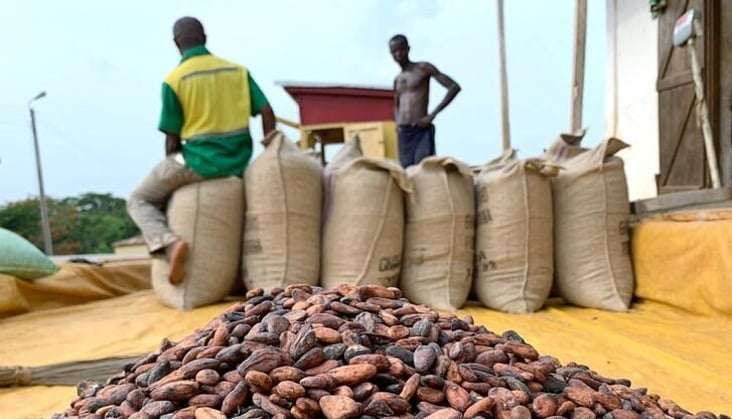Ghana, renowned as one of the world’s leading cocoa producers, is grappling with a significant downturn in its cocoa crop, which is reverberating across its economy.
The repercussions are evident in the country’s trade surplus, which has witnessed a sharp decline in the first two months of the year, posing a substantial risk to the stability of the national currency, the cedi.
According to data released by the Bank of Ghana, Ghana’s trade surplus contracted by a staggering 54% compared to the same period last year, settling at $392.8 million for January and February combined. A key contributor to this decline is the notable drop in revenue from cocoa exports, plummeting by nearly a third to $508.4 million, as reported by the central bank.
This downturn in cocoa production comes amidst a global surge in cocoa prices, with New York cocoa futures reaching unprecedented heights, exceeding $8,939 per ton.
The surge Is primarily fueled by a decline in cocoa production across West Africa, attributed to adverse weather conditions, disease outbreaks, and a shortage of fertilizer. These factors collectively signal a potential third consecutive year of cocoa bean shortages in the global market.
Meanwhile, the outlook for Ghana’s cocoa harvest for the 2023-2024 season, slated to conclude in September, is notably grim, with forecasts revised downward to an estimated range of 650,000 to 700,000 tons. This figure falls significantly short of the initial projection of 850,000 tons, underscoring the severity of the challenges faced by Ghana’s cocoa industry.
As the world’s second-largest producer of cocoa, trailing only behind Ivory Coast, Ghana’s diminished cocoa revenues exacerbate the woes of the cedi, which has already experienced a notable depreciation against the US dollar.
Year-to-date, the cedi has depreciated by 8.3%, positioning it as the third-worst performing currency among 24 African currencies. On Friday alone, the cedi weakened by 0.2%, reaching a value of GH¢13.45 per dollar.
The Implications of Ghana’s dwindling cocoa harvest extend beyond its trade balance, influencing broader economic indicators and impacting the livelihoods of millions of farmers and stakeholders within the cocoa value chain.
Assessing Key Indicators and Trends of Ghana’s Economy
Coincidentally, Ghana’s economic performance in the first two months of 2024 is also marked by a mixture of growth and challenges across various key indicators, as highlighted in the recent report by the Bank of Ghana.
While total exports experienced a modest increase of 1.6% year-on-year, reaching $2.9 billion, imports surged by 26% to $2.5 billion. This widening trade gap presents a notable challenge for Ghana’s external payments position, potentially impacting currency stability.
Moreover, the value of gold exports, a significant contributor to Ghana’s export earnings, saw a healthy rise of 16.6% to $1.3 billion. Similarly, oil shipments also advanced by 12.4% to $620 million, indicating resilience in the extractive sector despite broader challenges.
Notably, gross international reserves expanded by 4.6% to $6.2 billion, maintaining import coverage at 2.8 months, unchanged from the previous year. This indicates a stable reserve position, crucial for mitigating external shocks and maintaining confidence in the economy.
In addition, Ghana’s fiscal discipline showed improvement, with the budget deficit narrowing significantly from 8.3% of GDP in 2022 to 3.3% in 2023. This positive trend reflects prudent fiscal management and efforts to enhance revenue mobilization and expenditure control.
Despite the reduction in the budget deficit, public debt increased to 610 billion cedis ($46.76 billion) in 2023, compared to 446.3 billion cedis previously. However, the debt-to-GDP ratio eased slightly to 72.5%, indicating relative stability in debt sustainability metrics.
While certain sectors, such as gold and oil exports, demonstrate resilience and growth, others, like the banking sector’s rising non-performing loans, require vigilant monitoring and proactive measures.
Moving forward, sustained efforts to diversify exports, strengthen fiscal management, address debt sustainability, and enhance financial sector resilience will be essential for fostering inclusive and sustainable economic growth in Ghana.
READ ALSO: Commodity Traders Profit $100 Billion Despite Global Turmoil




















